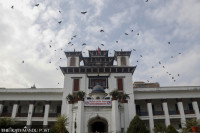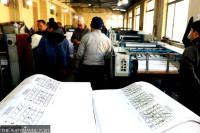National
No changes in liabilities of Tootle and Pathao in final tax assessments
The tax authorities have determined final tax liabilities for Tootle and Pathao, two ride-sharing companies, without making any changes in the liabilities in the initial tax assessments.
Prithvi Man Shrestha
The tax authorities have determined final tax liabilities for Tootle and Pathao, two ride-sharing companies, without making any changes in the liabilities in the initial tax assessments.
Tootle hence stands to pay Rs34 million and Pathao should pay Rs3 million to the government.
“Tootle received the final assessment of its tax liability last week and there has been no changes,” said Lal Bahadur Khatri, chief of Inland Tax Office, Lalitpur.
Meanwhile, Nara Bahadur Thapa, chief of Inland Revenue Office, Putalisadak, said they provided the final tax assessment to Pathao this week.
Officials said that they found no reason to revise the amount after both companies submitted their explanation on initial tax assessments.
While the total tax liability of Tootle includes both income tax and Value Added Tax (VAT), only VAT liability has been created in the case of Pathao, as it has been just a few months since the company made its foray into the country, according to concerned tax offices.
As per the Income Tax Act and VAT Act, the two companies now have 30 days to seek an administrative review on tax liabilities by filing an application at the Inland Revenue Department.
Provided the taxpayer fails to make an appeal within the deadline, the taxpayer can apply for an extension of the deadline within seven days.
The department can extend the deadline by another 30 days if the official finds a genuine reason to do so.
“If Tootle seeks administrative review from the Inland Revenue Department, collection of tax liability does not start immediately,” said Khatri. “But, in case the company does not go for an appeal, we will start collecting tax as dues once the deadline of 30 days ends.”
When asked about final tax assessment by the tax authority, Sixit Bhatta, co-founder of Tootle, told the Post that they were holding discussions with lawyers on how to respond. “I am working with my lawyer to decide our next move,” he added.
Both Tootle and Pathao have been subject to pay a huge amount in VAT despite not raising the same tax from the people who received services from them.
The tax authority said Tootle had collected VAT from service seekers in the first year of its operation after it launched the service in the fiscal year 2016/17. However, it did not levy VAT on service seekers in the following years. On the other hand, despite registering in VAT, Pathao had not raised VAT from its clients.
Both tax officials, however, said that ride-sharing companies should pay VAT because it is applicable to their businesses.
“The government has to recover VAT from these companies even if they have not raised this tax from those who have received their services,” said Thapa.
In fact, Tootle had created a system where VAT collected from the customers could be seen on its system, according to tax officials.
But VAT collection was not reflected on the system in latter two years. Bhatta said that they had raised VAT in the first year but discontinued it after learning that VAT was not applicable to public transport.
VAT is applicable to those whose annual turnover is over Rs2 million in case of service business, but its threshold for businesses of goods is Rs50 million.
Pathao and Tootle have emerged as an easy way to commute in the Capital because many say the ride-sharing companies save them from crammed public vehicles and expensive taxis. But the two companies were embroiled in controversy after they were found to have defaulted on taxes.
Bhatta complained that the start-ups are given tax exemptions and many other facilities in other countries but Nepal has taken a reverse course to discourage the start-ups.
“The issue emerged because the country does not have a law for intermediary businesses and I have to suffer,” said Bhatta. “Other intermediary businesses might also face similar problems until there are specific laws.”




 20.12°C Kathmandu
20.12°C Kathmandu















